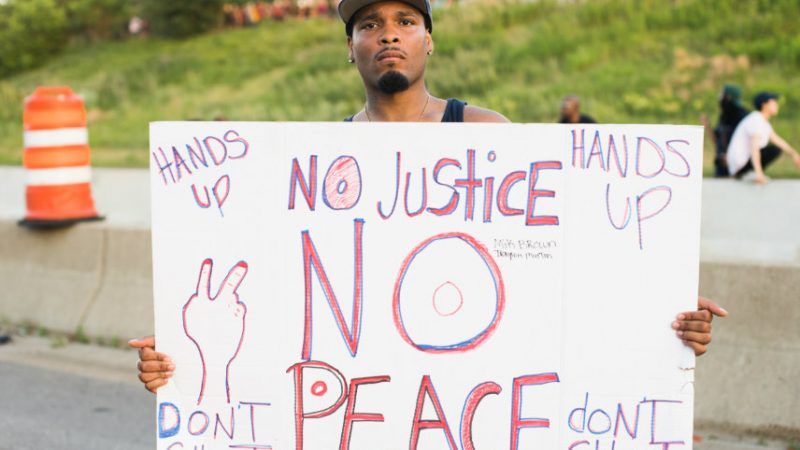Conservatives Need to Put Aside Kneejerk Police Support
It's time for conservatives to recognize that efforts to reform police departments are as necessary as efforts to reform our public schools.

When it comes to problems in the public schools, my conservative friends are right on target with their critique. These schools often do a poor or mediocre job performing an important function. That's because they lack competition and are funded by political priorities rather than customers. Teachers' unions have undue sway over the entire process. They make it nearly impossible to fire even grossly incompetent teachers and that small percentage harms many students. Those same unions drive up unsustainable benefit costs.
Like everyone else, conservatives appreciate teachers—but they realize that the current taxpayer-funded system needs many reforms and more competition. There's nothing wrong with pointing this out, which is a reality in any government-funded, union-controlled monopoly anywhere in the world.
Yet when it comes to another type of taxpayer-funded, union-controlled monopoly, conservatives lose their sense of perspective. I'm referring, of course, to local and state police agencies. The same dynamic described above works there, too. Police agencies are bureaucratic. Unions protect the bad apples and make it nearly impossible to fire anyone—even officers caught on video misbehaving or being abusive to the public. The agencies hand out unsustainable benefits and have some bizarre spending priorities (tank-like vehicles, etc.). They are secretive and insular. They use asset forfeiture to grab the property of people never convicted or even accused of a crime.
Most of us appreciate police officers, recognizing that they perform an important and tough task. But whenever there's a questionable shooting or bill to increase accountability and expand the public's access to police records, most conservatives instinctively side with the police. Their kneejerk defense of these agencies (although they sometimes criticize their pensions) defies their stated belief in limited, accountable government. Maybe it's because of their dislike of Black Lives Matter and other leftist protesters or their fear of crime, but this is reality. Yet there's nothing anti-police about calling for police reforms any more than it's anti-education to call for school reforms.
"Imagine if I were to tell you there is a large group of government employees, with generous salaries and ridiculously cushy retirement pensions covered by the taxpayer, who enjoy incredible job security and are rarely held accountable even for activities that would almost certainly earn the rest of us prison time," wrote A.J. Delgado in a 2014 column in the National Review. It's a conservative magazine, which makes the article noteworthy. "When there is proven misconduct, these government employees are merely reassigned and are rarely dismissed. The bill for any legal settlements concerning their errors? It, too, is covered by the taxpayers."
The writer called for conservatives to take a more thoughtful approach to the policing issue. Having written about many police use-of-force cases, that's my belief, too. Some of these cases are shocking. Many of them can viewed these days online. Often, a small number of officers are the source of a large number of complaints. They are trained to be unnecessarily aggressive. Officers are rarely punished and often given back their jobs if they aren't ultimately convicted of a crime even if their behavior was atrocious. The union insurance funds pay for the legal defense of police accused of egregious behavior. Union priorities have caused police agencies to focus more on military tactics and less on the hard work of community policing.
Police agencies hide information that makes them or their officers look bad. The rules of engagement are written mainly to protect the officer. Powerful police unions take out politicians who promise to reform the system or pare back pensions and other benefits. Many of those benefits are ludicrous. Have you ever heard of Chief's Disease? Most officers retire on "disability" as a way to slash their tax burden in retirement. It's often viewed as yet another benefit or entitlement.
Does this sound like a system that needs reform?
Yet whenever reforms are proposed most (but not all) conservatives side with the cop unions. A Senate bill in Sacramento would make public some disciplinary records of police accused of sexual abuse or who use deadly force. That measure was a pared-back version of a reform that's 12 years in the making (since the 2006 California Supreme Court Copley decision, which shrouded records in secrecy). It passed out of committee but has a long road ahead. Conservatives ought to embrace greater openness regarding government agencies with life-and-death power, but don't count on it.
No doubt, liberal activists seem to protest everything officers do. They don't make distinctions between an appropriate use of force and an egregious one. They sometimes disrupt meetings and block freeways. That's frustrating and makes it tough for the broader public to understand the problem. Both sides miss the main point. Our policing problems reflect the nature of police agencies. They are unaccountable monopolies, and their employees are in unions that protect the worst among them. It's time for everyone—conservatives included—to recognize that efforts to reform police departments are as necessary as efforts to reform our public schools.
This column was first published in the Orange County Register.
Steven Greenhut is Western region director for the R Street Institute. He was a Register editorial writer from 1998-2009. Write to him at sgreenhut@rstreet.org.


Show Comments (65)